

Mata do Tossi is the name of a relatively small forest between the Kirongosi Lagoon and the Lomba River, some 80 km west of Mavinga. I had never heard of the name and most likely is not in any map. That was the name given by the Ganguelas to a small area in the right hand bank of the River Lomba, and almost unheard of until it became famous amongst the people that went through hell in that area.
My formal introduction to the Tossi (I used to cross it before the war in my hunting trips with Chico Salazar) occurred very earlier in my military career, less than a week after arriving at Mavinga. One afternoon the Captain called me to his office and instructed me to prepare a combat group to intercept an enemy supply column known to be travelling from Zambia to the source of the Lomba river.
That would be my first mission and I could hardly wait. I called the three sergeants of my platoon and instructed them to prepare the men to leave at first light. I also selected some of my old friends from the special groups (GE's). Not many I decided. All together, our group comprised of 30 army and 10 GE's personnel.
Until that date, the MPLA gerrilla groups operated in small numbers of 5 to 10 trained guerrillas and some poorly trained and armed militiamen. Not a match for 40 eager blokes... that was the spirit. Next morning I inspected the troops before boarding the Berliet's (multi fuel army trucks) and noticed how lightly armed the soldiers were. No machine guns, no mortar or rocket launchers. Why bother carrying them, we don't need everybody said.
That was the beginning of my first major lesson in leadership: if you are in command, do what you think it is right not what others think you should. When the judgement time comes you will stand alone to face the music. On that morning I didn't want to look maçarico (derogative name given to fresh troops) and went along with the general opinion. Later on I discovered that some soldiers did not even carried the full compliment of ammunition for their rifles.
We boarded the Berliet's and headed to Kirongosi. The plan was to be launched on the north side of the Kirongosi lagoon, cross the chana (savanna) between that and the Tossi forest and reach the Lomba river. Once there we would follow the river until detecting the trail of the column. Half way through our trip to Kirongosi one of the trucks broke down and we decided to continue with one truck to the Kirongosi and send it back to get the rest of the troops. It was later in the afternoon when we finally got everyone at the starting point. We started our mission from the Kirongosi lagoon just across from where in past times, the Kirongosi Angola Safari camp was situated. The night was fast approaching when we reached the chana that separated us from the Tossi forest.
Until there we had seen no traces of the enemy and therefore we camped in style: fires burning and people sitting around the fire happily exchanging tales and jokes.
Next morning, after a healthy breakfast of army biscuits, chocolate milk and tinned beans with chouriço we crossed the savanna and entered the Tossi. As soon as we entered the Tossi we were ambushed by a small group that run away as soon as we counter attacked. For the rest of the day the enemy group kept annoying us but always avoiding real confrontation. We went after them all day and as the day wore out we noticed that we were approaching the Lomba river and a place known for its cacimbas (water holes).
At 4 pm we decided to give up the chase and headed to the water holes to fill our canteens. The water remaining in our bottles, if any, was hot after a day under the scorching sun of the Angolan eastern plains. We contacted the base and informed them of our intentions of abandoning the chase and find a place to spend the night. As we approached the water holes we started hearing sporadic gun shots all around us, but at the time water was the only thing on our minds.
We arrived at the water holes, placed the troops into a circle and started getting ready to spend the night. I pumped up my air mattress, opened a box of biscuits that Filomena cooked for me and laid down for a well deserved rest. The small arms fire continued to be heard in the distance but nothing seemed to raise our concerns. After a while, Kassanga, my GE's friend, with his beard platted and decorated with missangas (glass beads) came to talk to me. He was not happy with the gun fire around us and recommended us to leave the place. He reminded me that the water holes were a well known resting place and therefore we would be exposed to an attack if we camped there for the night. I agreed and asked him to tell everybody to start getting ready to shift camp.
Kassanga started walking away when we heard the unmistakable sound of the shells leaving the mortar tubes and I saw with disbelieve my friend being hit by a RPG rocket. I grabbed the first gun I could lay my hands on and dived away from the mattress just in time to see the soil in front of me erupting under the impact of the mortar shells. The precision of the mortar fire indicated that they had been previously aimed at the water holes in the anticipation of us camping there. The gun fire was intense and I crawled behind a tree trying to comprehend what was happening. I remember looking up and seeing the trunk of the tree where I was hiding, splitting open over my head. It took me several seconds to realise that a bullet had just gone through.
Under extreme pressure the brain (mine at least does) seems to work extremely fast, reviewing the millions of things going through your mind and therefore you get the impression that the World around you moves in slow motion.
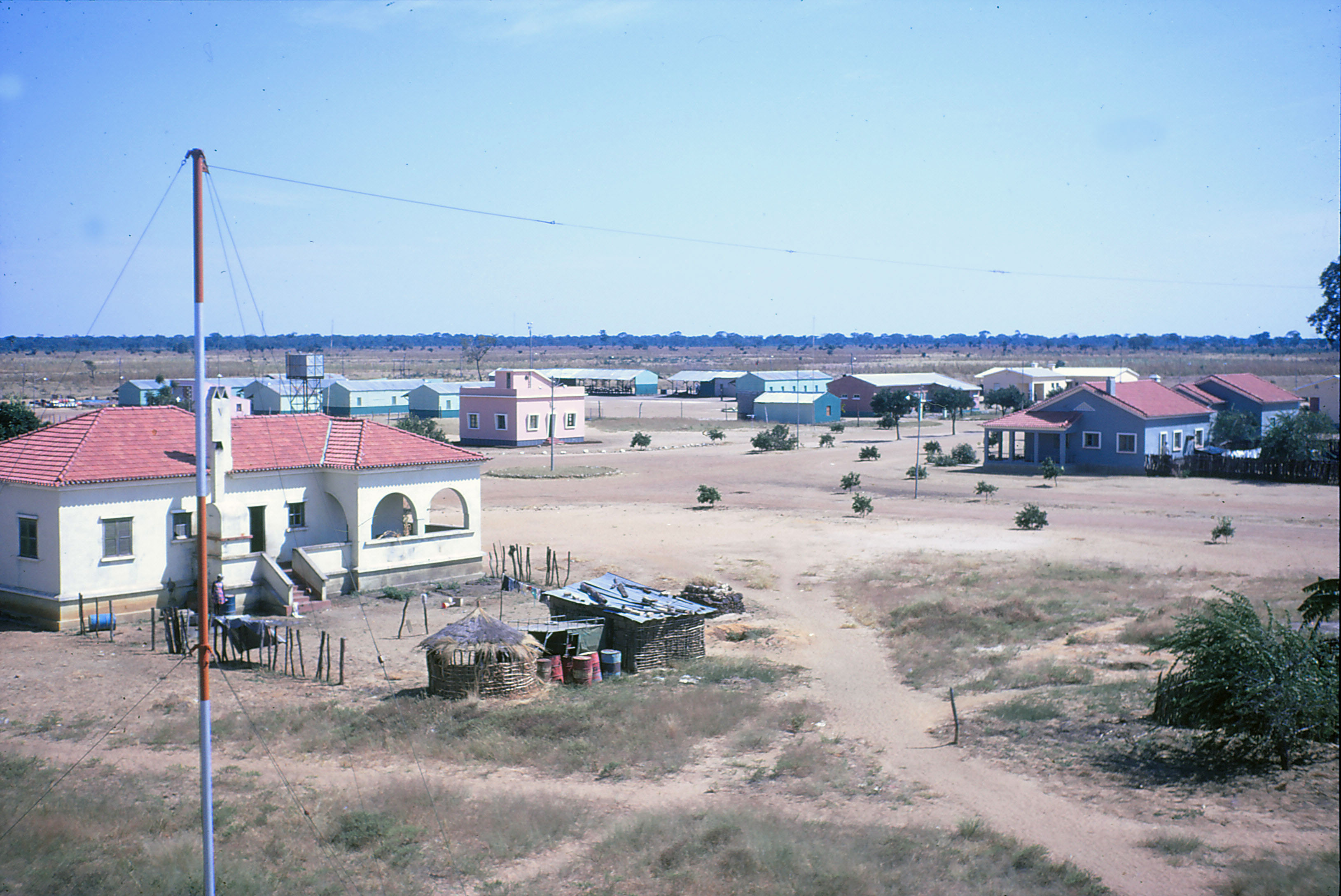
Mavinga - The green buildings are the barracks
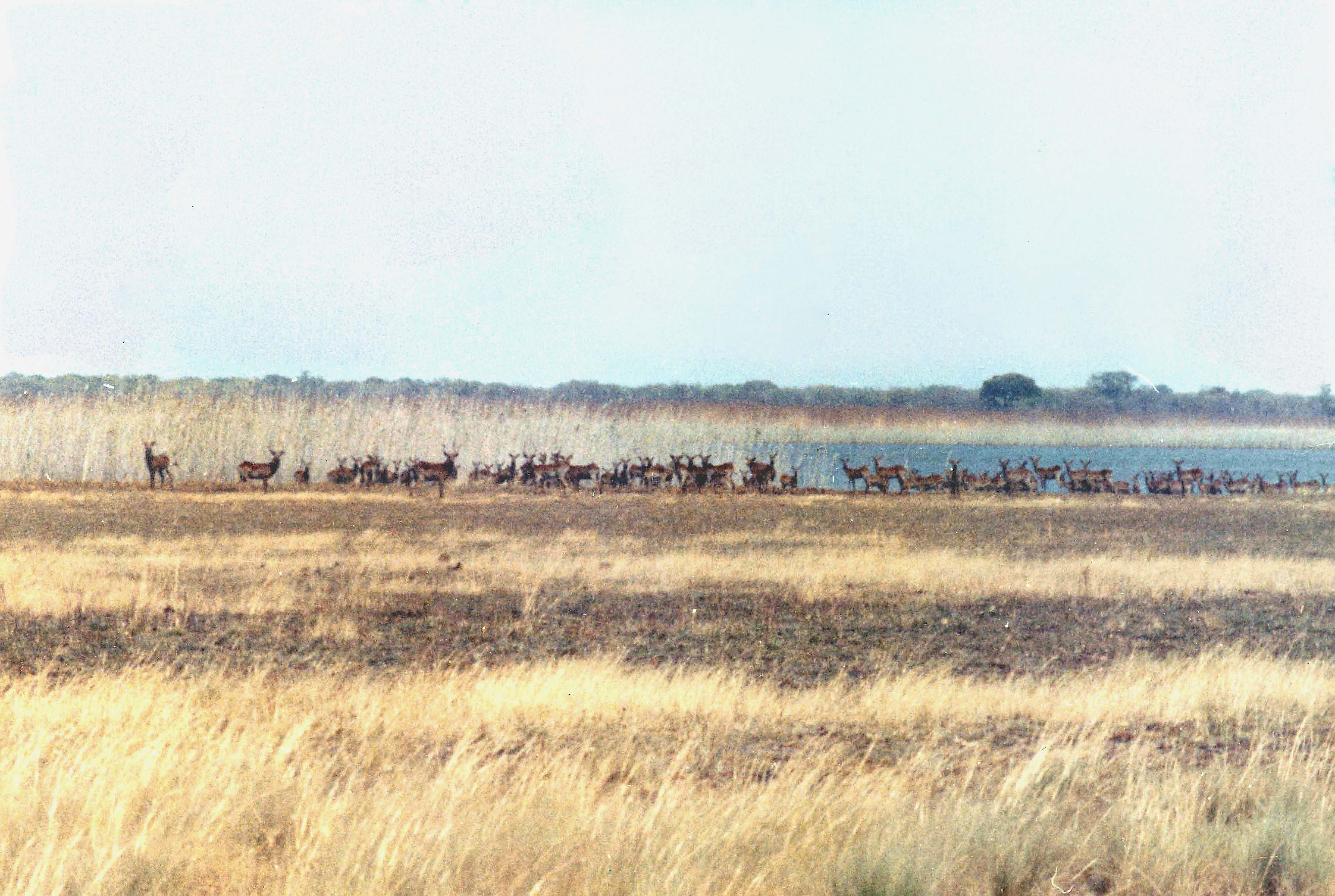
Red Lechwee at Kirongosi Lagoon, near the drop off point
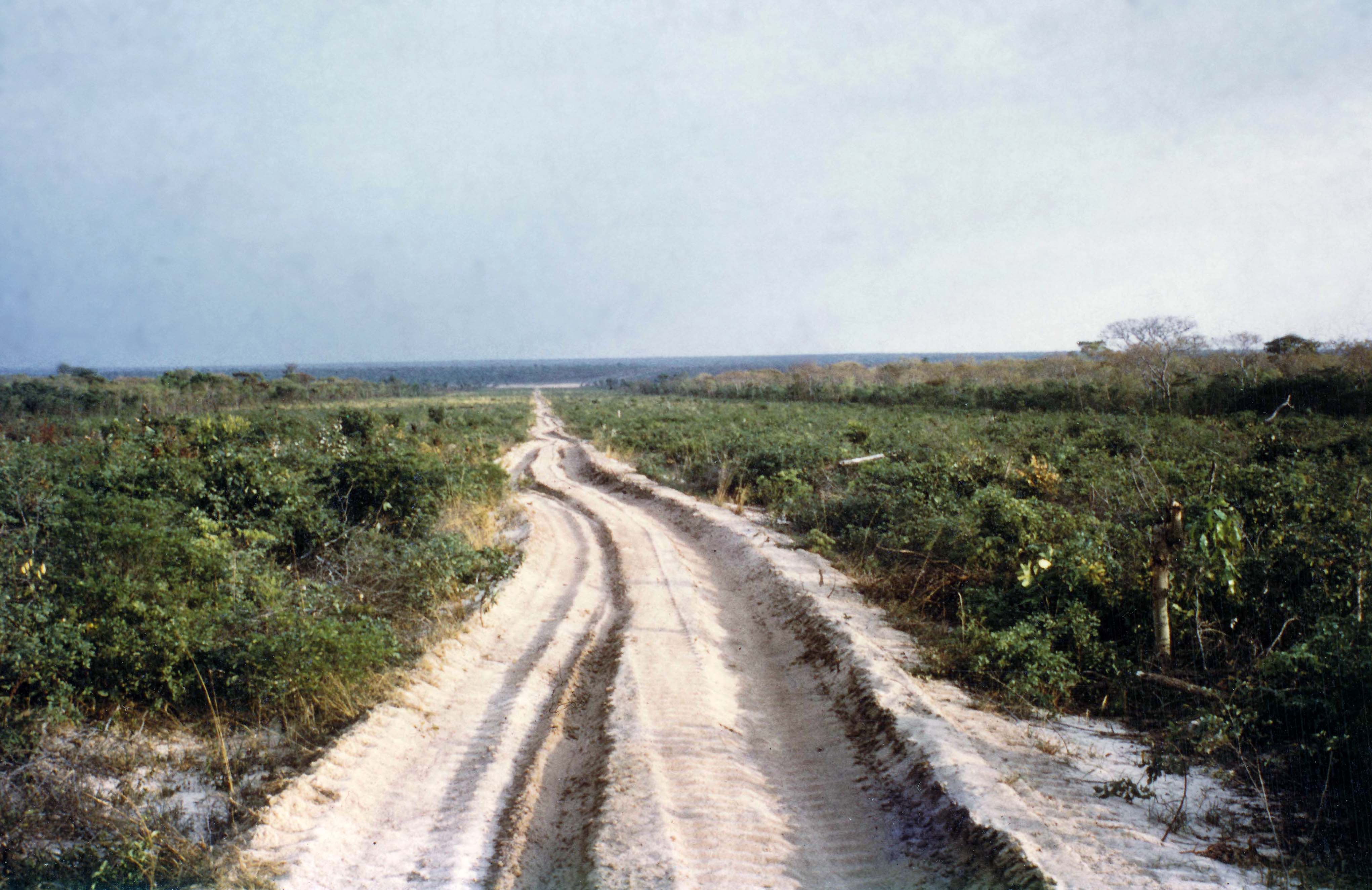
Picada - The type of roads in the Cuando Cubango
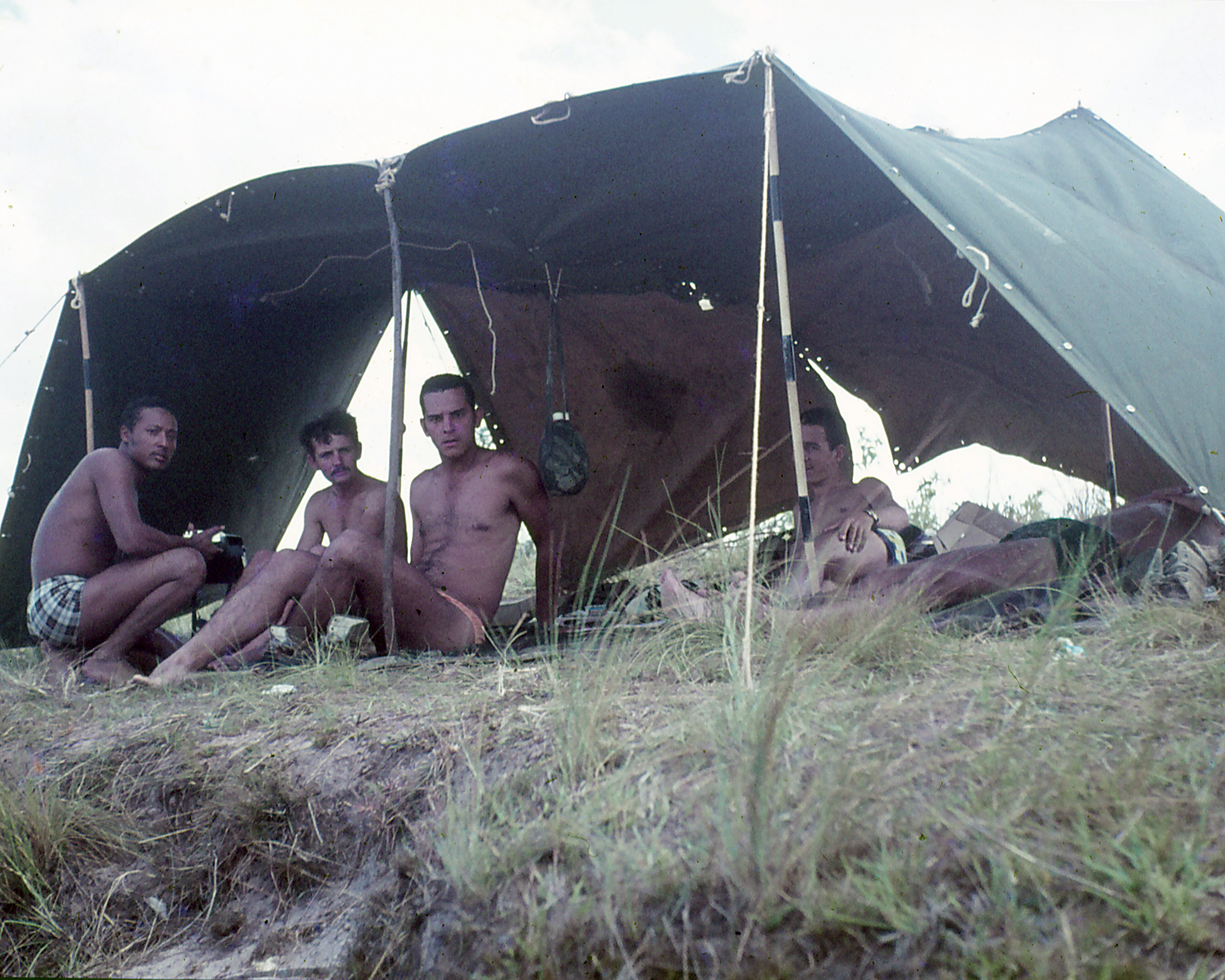
Providing "security" to the Lomba Bridge re-builders
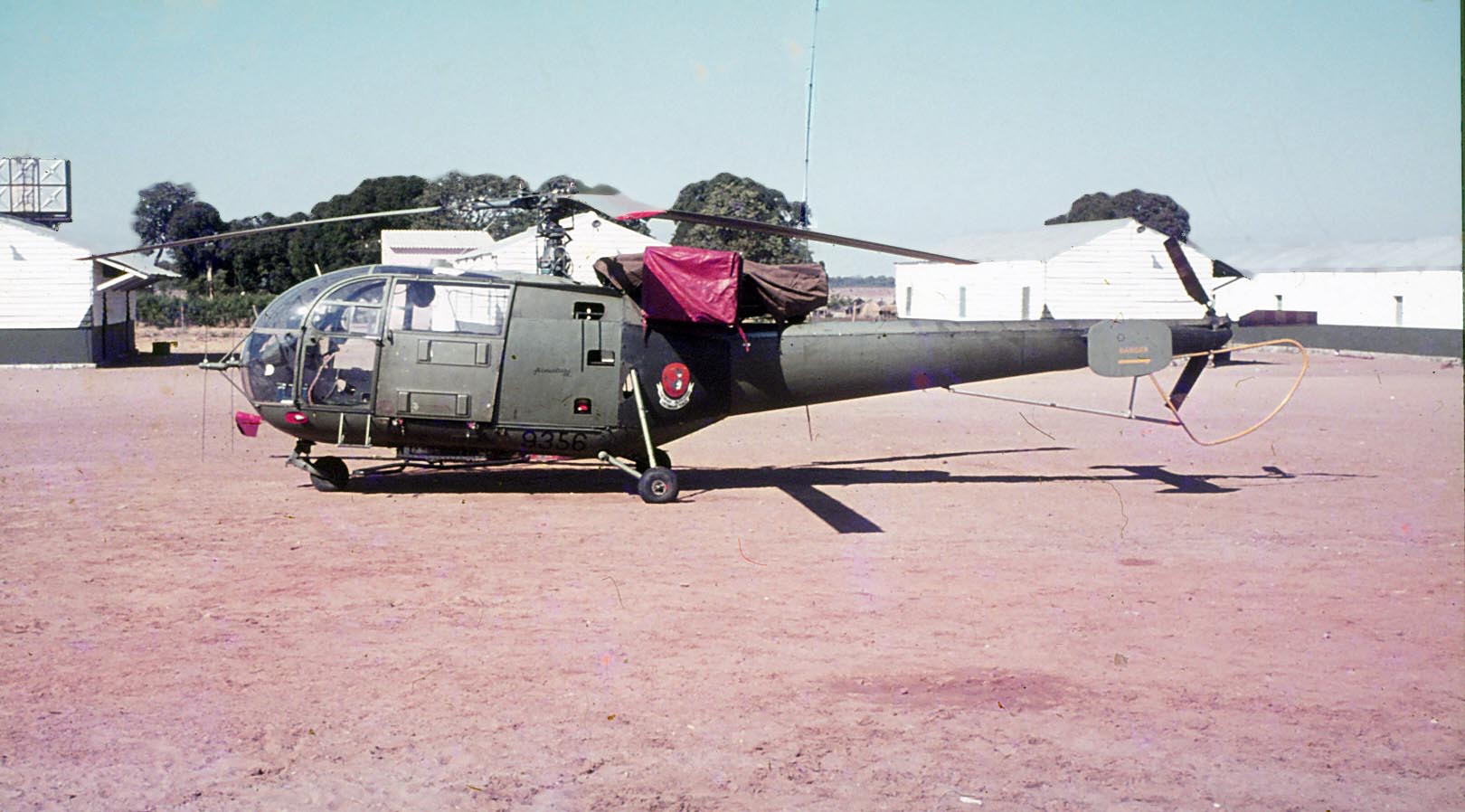
"O Moscardo" as we called the helio gunship
I looked around and found that only few (eleven to be more precise) men were left from our group: Sergeants Pina, Chorondo and Jardim, Corporal Miguel, soldiers Capovila, Sabata, Chissanga and others that I no longer remember the names. While we had dilagramas (fragmentation grenades launched with the rifle using a blank shot) we kept the enemy at bay, but when we run out of them they started encircling us and trying to place us between them and the savannah.
Fortunately for us the civilian population was following the guerrillas chanting words of encouragement and abuse to us and the sound of the chants gave us a clear indication of their position and intentions. When I realised that our position was indefensible I suddenly remember that I had left my bag behind with my camera (a "very expensive" $30 camera ?!).
Typical case of a mixed up brain. I ran towards the water holes and when I arrived there the enemy was already going through the bags and other equipment left behind by the troops, radio included. I entered the opening around the water holes spraying bullets left right and centre, grabbed my bag and ran towards the savannah. Obviously the surprise amongst the enemy was total and this most likely saved my life.
After recovering from the surprise, one of the guerrillas, probably the commander, started shouting to his men to stop shooting and try to catch me alive. As I ran into the open space they fired at me from the savannah. Well, people say that fear gives you wings and I was no exception. Because I did not have intentions to change sides, I had a machine gun in my hands and had no worries about using it, I made it back to my men with my precious camera.
In future clashes with this group we painfully learnt about their strategy. The enemy plan was to push us out of the protection of the jungle into the open plain and expose us to the fire of elements that beforehand were strategically placed out in the savannah waiting for us. Fortunately I understood very quickly what was happening and ran back into the jungle.
With the enemy tentacle encircling us we decided that it would be much healthier if we got out. We moved fast but silently and the noise around us started to abate, a comfortable indication that we were moving in the right direction. From time to time we could hear the cheers of the enemy going through our bags (mine was firmly on my back... thank you). Our group was moving through the jungle in a single file formation, senses working overtime and all the muscles tense as a bow and ready to spring at the first sign of trouble.
In the African jungle there is a tree that has the seeds enclosed in a pod similar to a broad bean but black and the elephants love it. When the pod is fully formed and dry it opens with a small explosion throwing the seeds to considerable distance. This is the mechanism nature uses to propagate the species.
Back to our column of very "attentive" soldiers. Suddenly, in the silence of the jungle, we heard a metallic sound and in a flash we were all on the floor pointing the guns in all directions. Probably because we were almost out of ammunitions no one fired. We waited for a while but nothing happened until we heard again the cracking sound of the seed... and a nervous laughter broke the silence.
A bit later we spotted one of the GE's, Mussole, laying on the floor exhausted from running. He was so exhausted that he had given up. When he saw us he told that his rifle was hidden in a bush close by and asked us to take it because he was going to die there. The rifle is like a symbol of power and very precious to a soldier. To return to the barracks parading guns captured from an enemy was the dream of every soldier. The reverse was unthinkable if not for any other reason at least because it pre-supposed that you had died.
In Mussole's case the only thought in his delirious mind was his rifle being captured by the enemy. I remembered that I had in my bag an Alka Seltzer (effervescent indigestion pills). I got one, put in his mouth and told him that it was a remedy for exhaustion. As soon as the pill started frothing up in his mouth Mussole jumped as if he was hit by lightning, grabbed his rifle and disappeared in the direction of Mavinga. We never saw him again.
As the men started arriving one by one at Mavinga and told their version of the disaster, it did not paint a good picture about the chances of the absent ones being found alive. Fortunately Mussole arrived in Mavinga the next day with the news that we were alive. For my parents and Filomena it must have been a great relief.
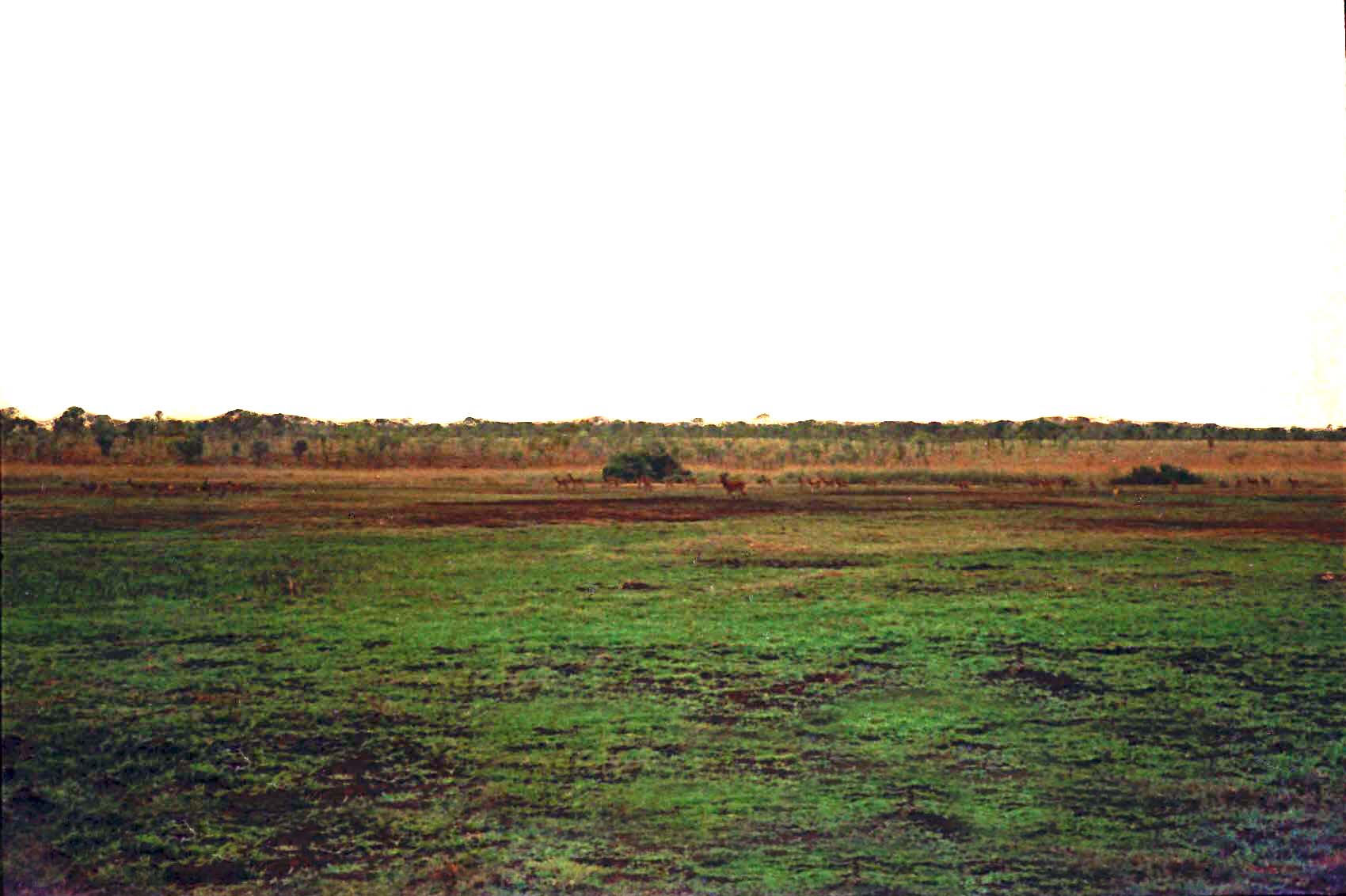
The Lomba River, not far from the Tossi
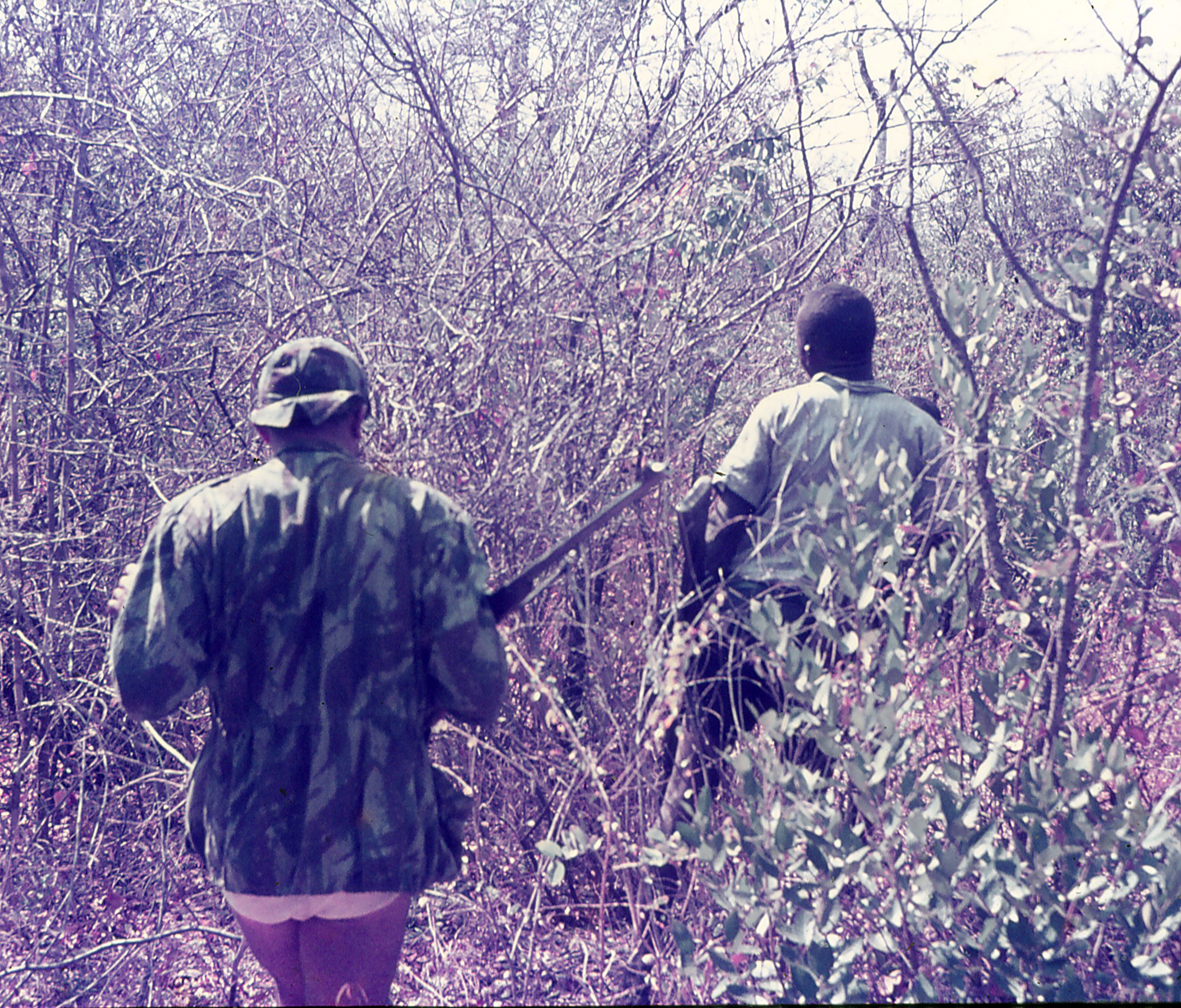
Mata do Tossi - in the middle of the Tossi with Chico Salazar
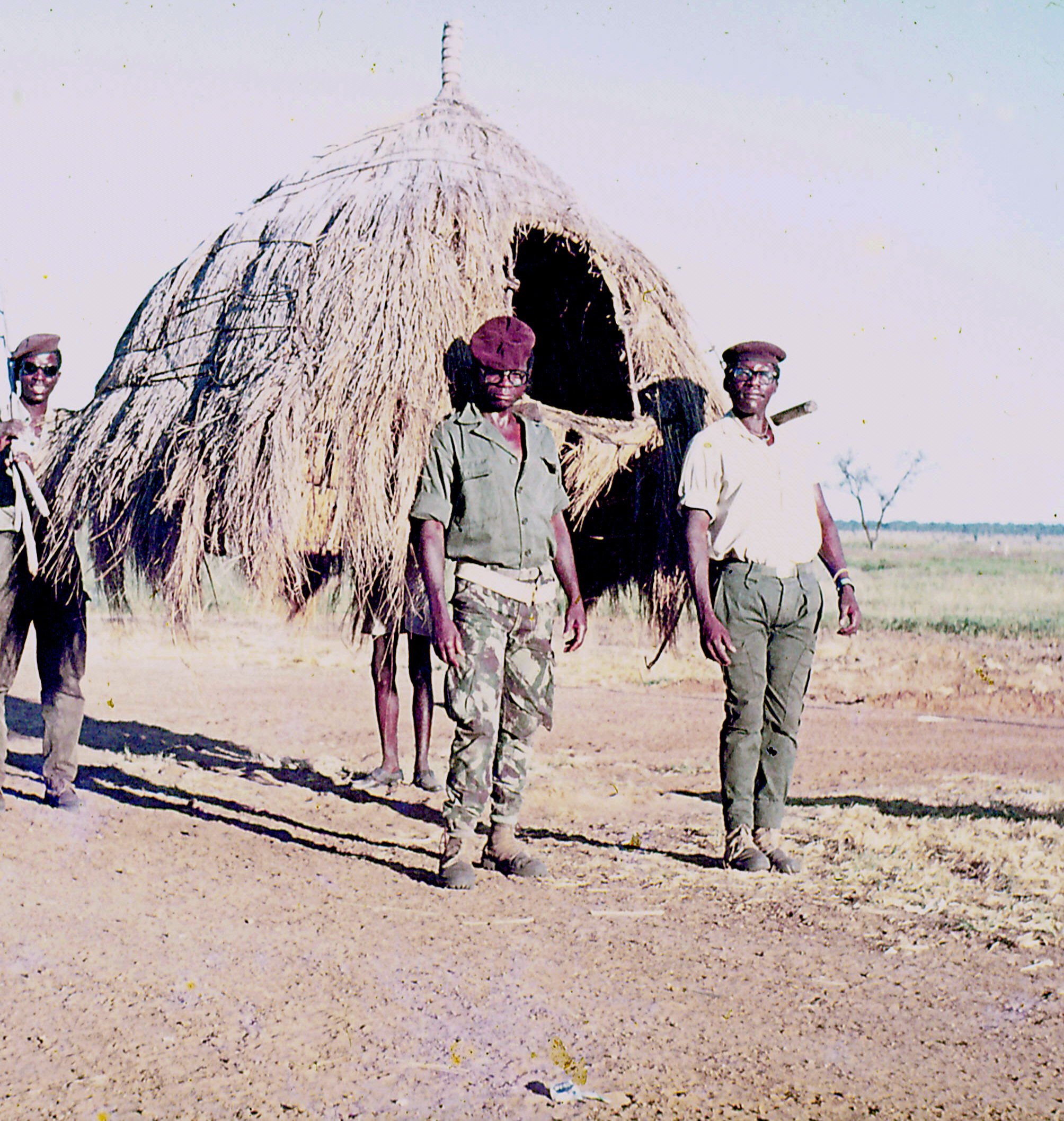
A group of GE's carrying a grain storage hut.
Mussole is the one in the center
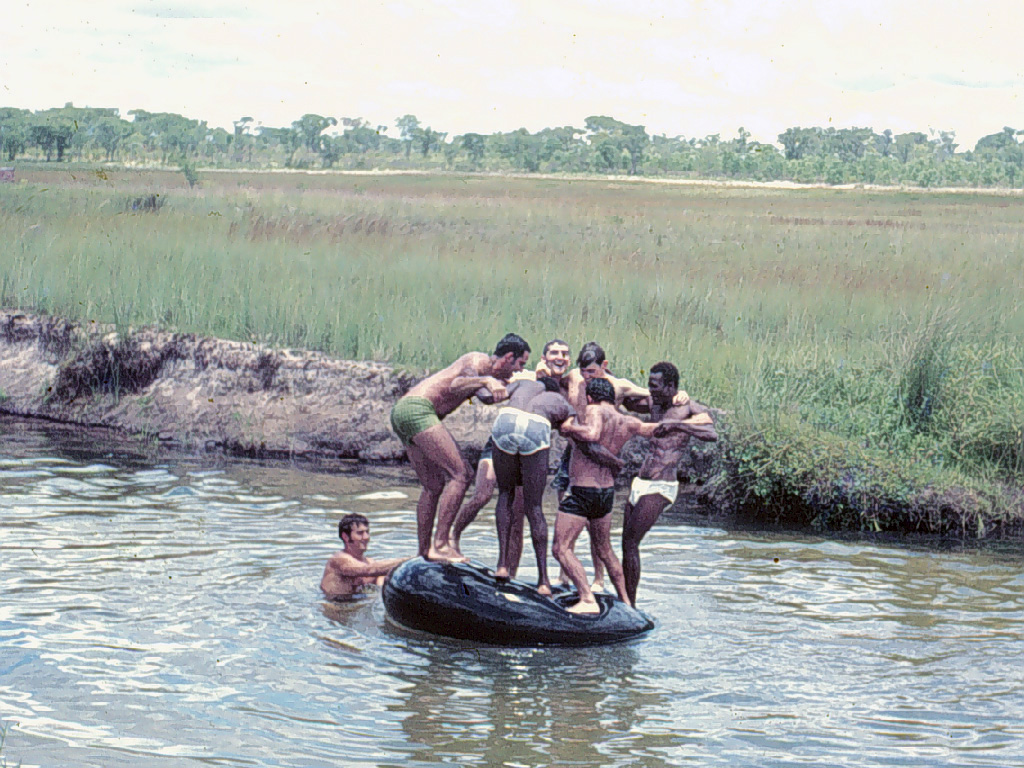
Killing time at Dima outpost
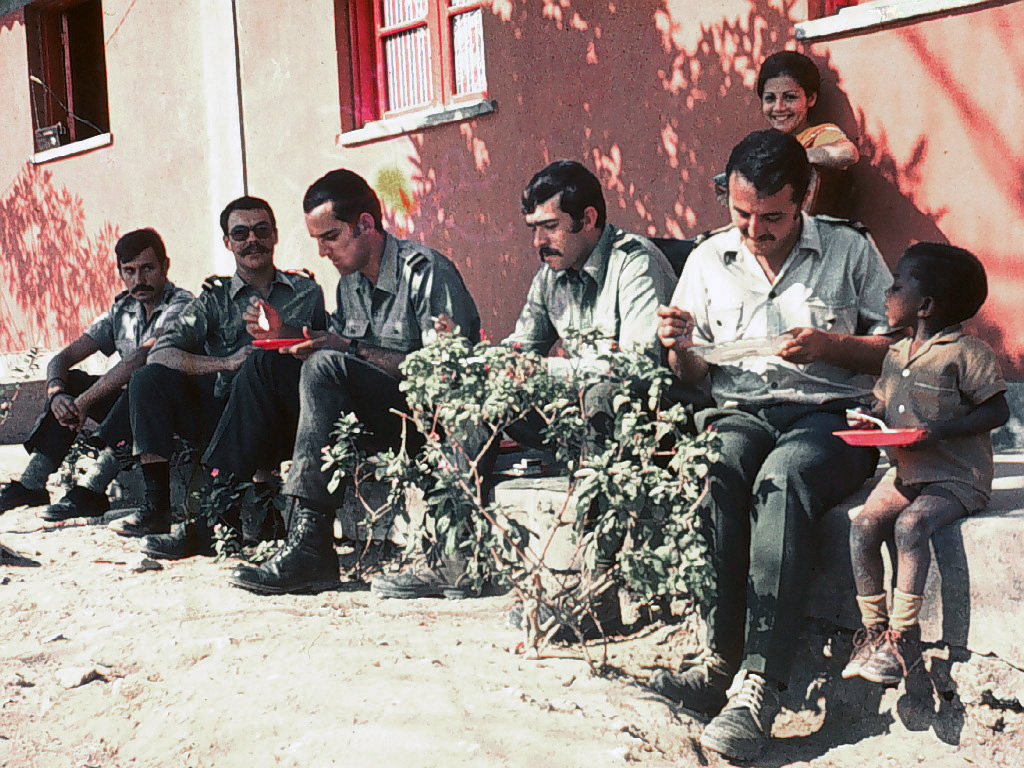
"Cuito Cuanavale
When the night felt we moved into the savannah to avoid being ambushed and of course I am sure no one slept all night. Earlier in the morning we moved back into the jungle and started heading home, slowly getting our egos back into shape. At that time we did not know the strength of the enemy force. When we saw a small group of people crossing the savannah, we decided to ambush them and interrogate the prisoners. An old fellow that we took prisoner explained what was going on around us.
He told us about the size of the enemy force and the types of weapons they had and we started understanding the extent of the trouble we were in. According to him over 200 guerrilla were concentrated there under the command of a famous leader called Kuangungo Kuenhe. I knew Kuenhe from before the war; he was cousin of Kassanga my friend GE that was killed the day before.
The reputation of Kuenhe was already considerable in the area. He had his base in Omema Kusivala (black water lagoon), south west of Kirongosi. Later on we learnt that the MPLA had decided to change their strategy and started operating conventional warfare size units. They were following the guerrilla manuals to the letter: Guerrilla warfare is invincible but can not win in its original form. After the enemy infrastructures are destroyed or inoperative due to the guerrilla activities you should move into the conventional war and gain control of the country... They believed the time was right...Big mistake as time proved.
The enemy, alerted by the noise of the ambush launched groups after us and we spent the rest of the day playing cat and mouse again. We moved away from the banks of the Lomba river towards the Kirongosi lagoon taking a long route to confuse the enemy that assumed that we would be heading directly to Mavinga.
The south of Angola is the beginning of the Kalahari and Namibe deserts. During the day the temperature soared to 45 degrees Celsius and higher and at night below zero close to the rivers. Once we left the Lomba river, we would not have any water until the Kirongosi lagoon and our water was fast running out. Only few of us had the canteen with us at the time of the attack. We kept walking for more than one hour after the dark of the nigh surrounded us. That way the enemy would not be able to follow our trail. We spent another night exposed to the bitter cold -no camp fires and story telling this time- and started moving at the first light.
With the sun rising, the temperatures quickly climbed to the forties and we all started feeling the effects of the thirst. Close to mid day I looked at sergeant Pina and could see his lips were swallow and the signs of dementia setting in. He was continuously repeating: "I would rather drown than die like that". We stopped and decided to wait for the day to cool down before moving again. Chissanga one of the soldiers in my combat group was a member of the Cuanhama tribe in the south west of Angola. Cuanhamas are used to the harsh Namibe desert weather and lack of water does not seem to affect them as much as it affects others. Chissanga approached me and asked if he could continue walking because he believed that water was not far away. I agreed and he left with the understanding that if he found water he would fire three shots in rapid succession.
We cut some bissapas (small bushes) and laid down covering our faces with them to avoid the assault of the honey flies. I can not remember how long we laid there trying to forget about the thirst, constantly hearing Pina mumbling in his delirium and asking to die by drowning. Suddenly from very far we heard three shots and nothing could have triggered such explosion of energy from our tired bodies. We all shouted: Water!!! and ran in the direction of the sound.
When we finally arrived there we found a "beautiful and inviting" mulola (small open area in the jungle ) with a cacimba (small water hole) with putrid water were wild animals drunk and did everything else they felt like. Everyone dived in and started drinking as if it was the best cocktail in the world. In a flash of brilliance my brain reminded me about the billions of germs swimming in that water an I took my handkerchief and very wisely used it as a filter and started sucking water through it. Soon my survival instinct overpowered sanity and told me that not enough water was filtering through. Forget about the germs and start drinking properly you fool; a voice said. The horrible smell of ammonia, probably from animal's urine did not stop us from drinking until we could not take any more.We refilled the canteens with that beautiful concoction and continue towards the Kirongosi lagoon.
We realise then that the old man, our prisoner was no longer with us. He may not have shared the desired for water with the same intensity as we did.
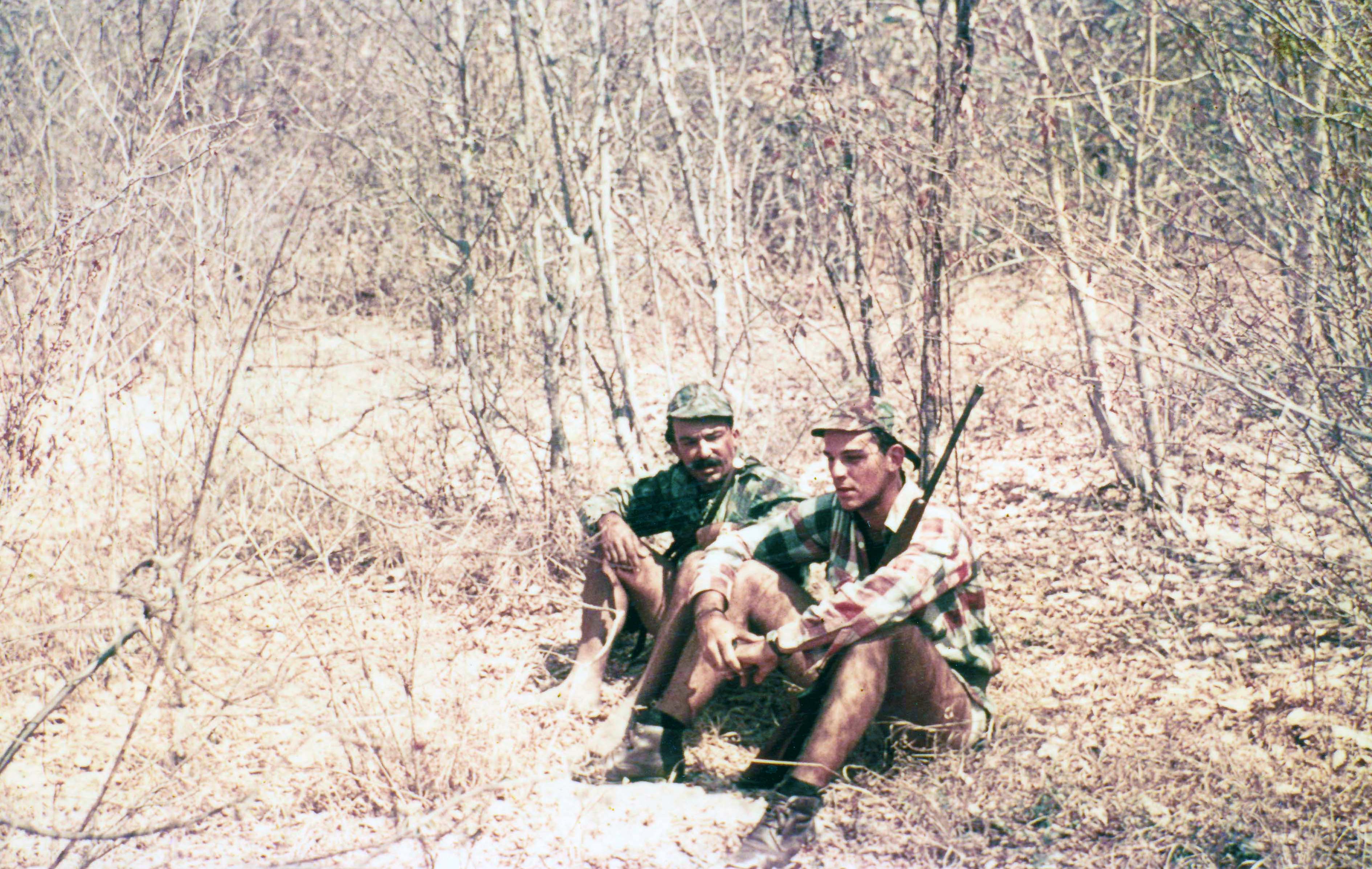
Chico Salazar and I in the Omema Kusivala region hunting
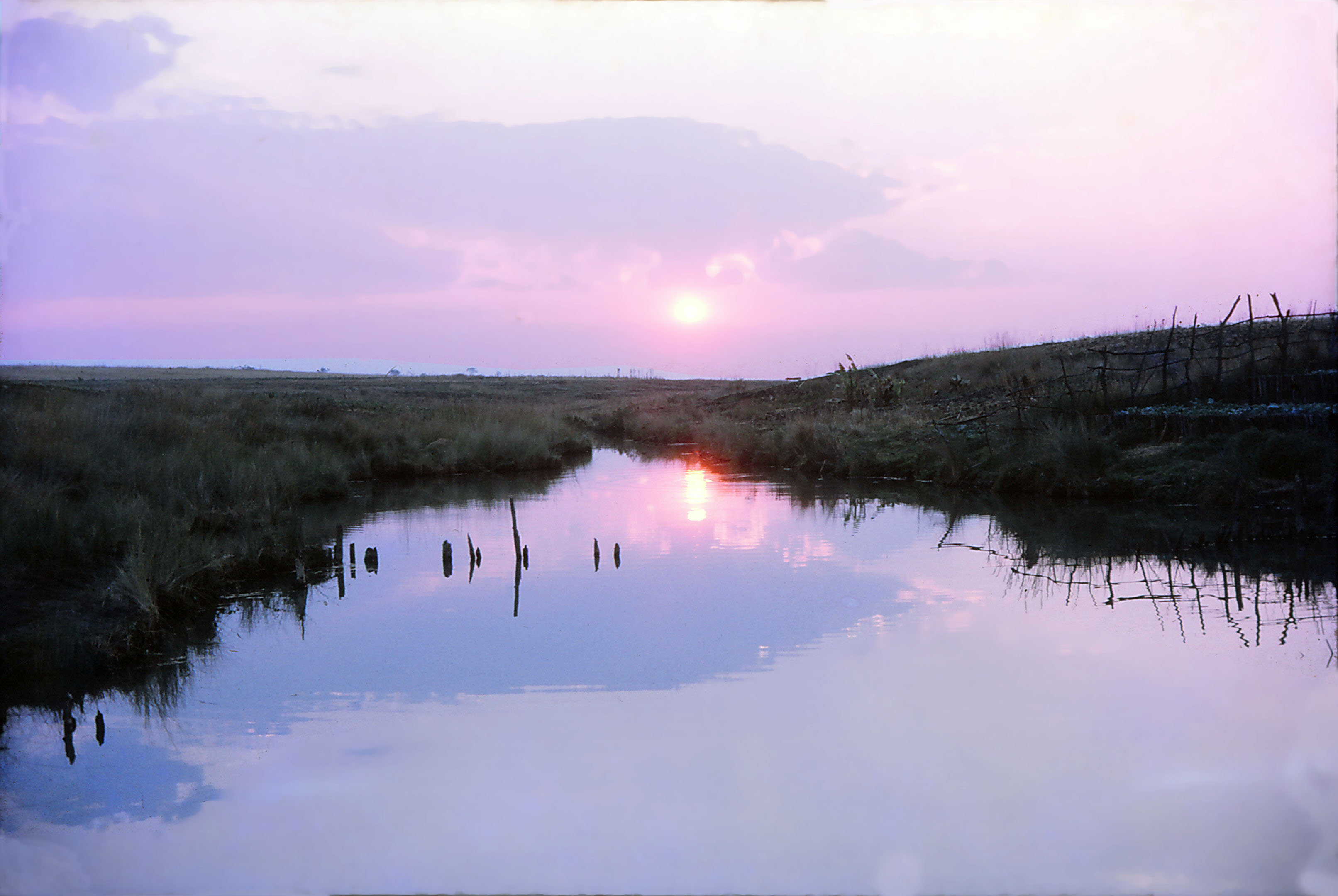
Cubia river near Mavinga
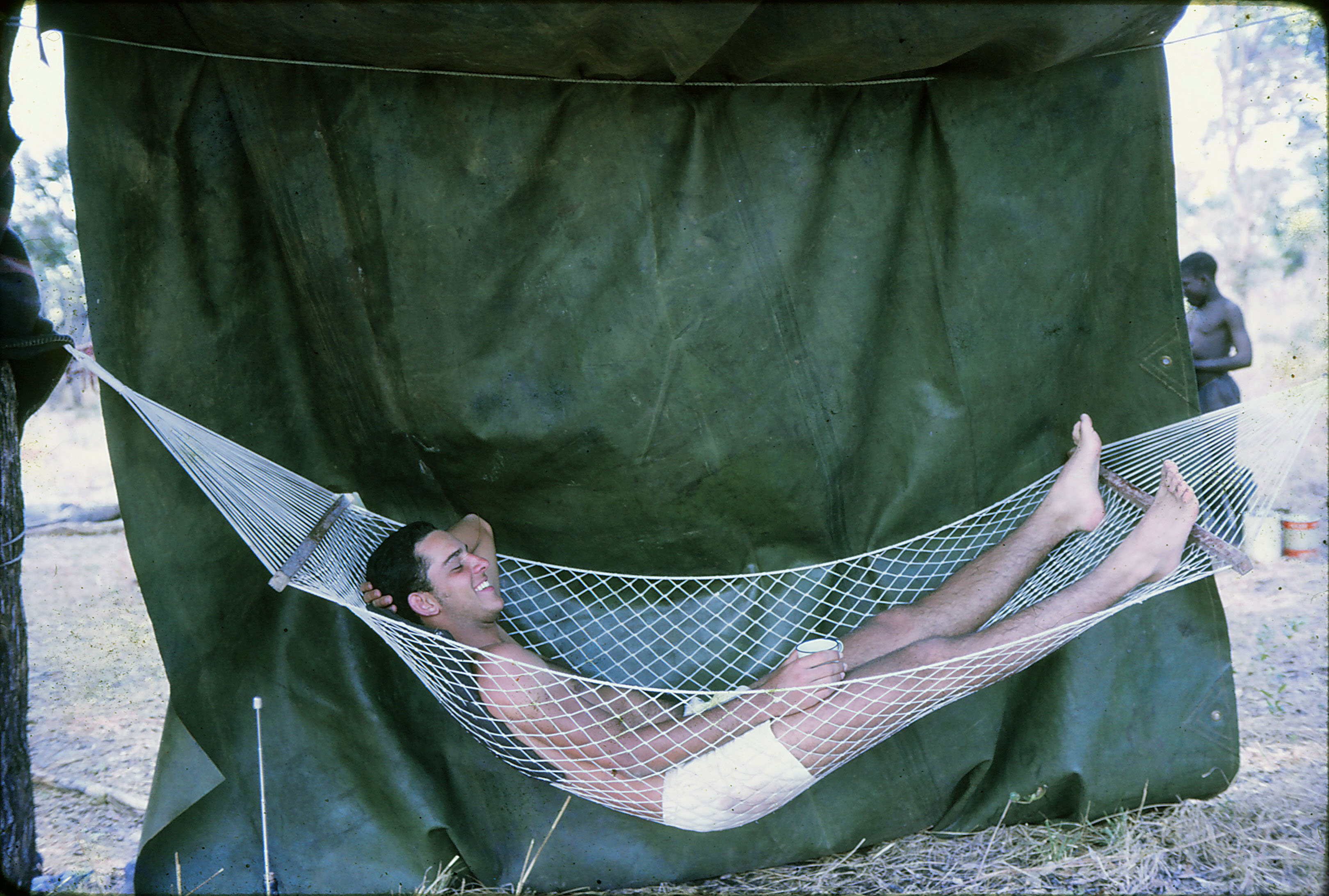
Definitely not the way we slept after the disaster.
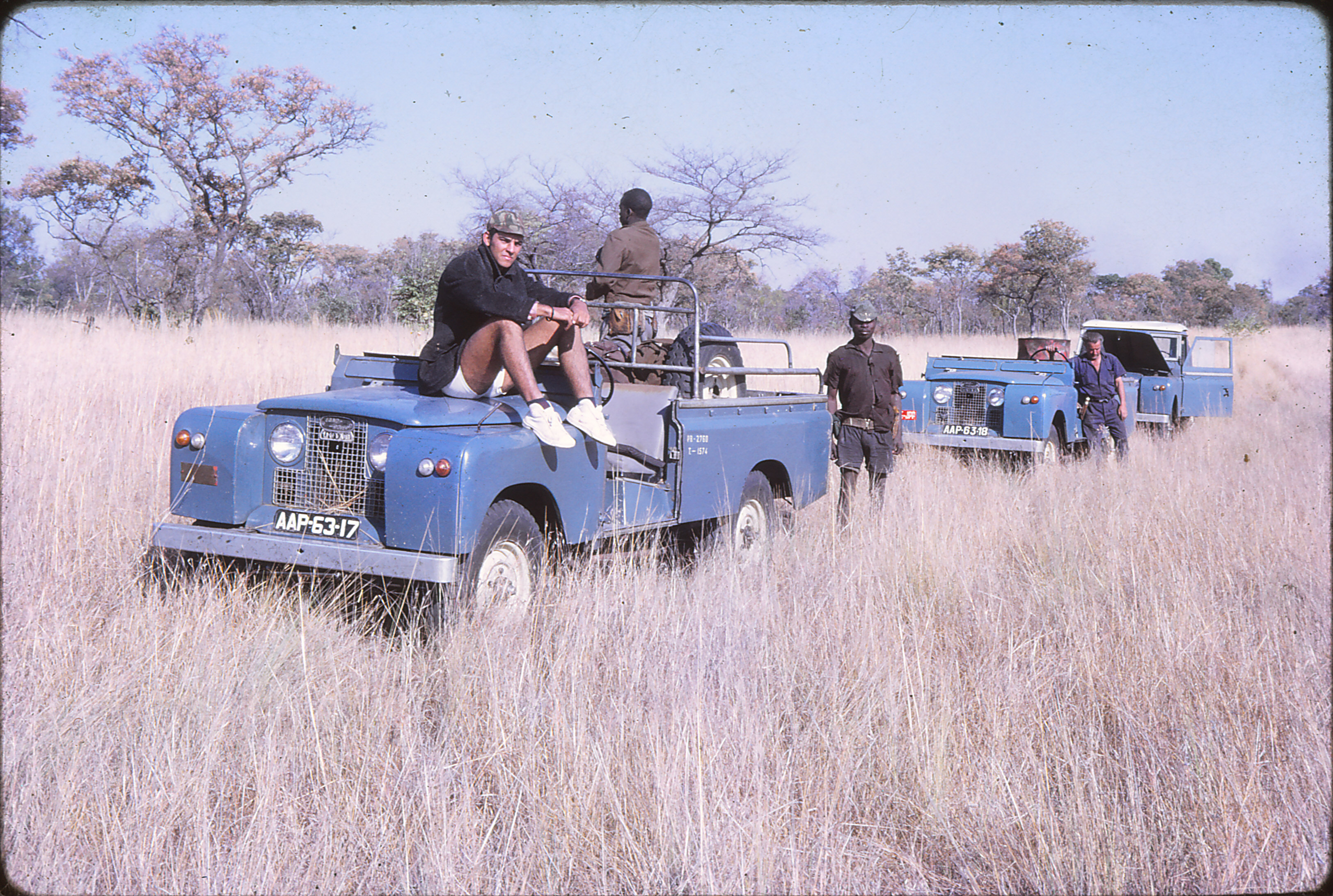
Hunting party somewhere in Cuando Cubango
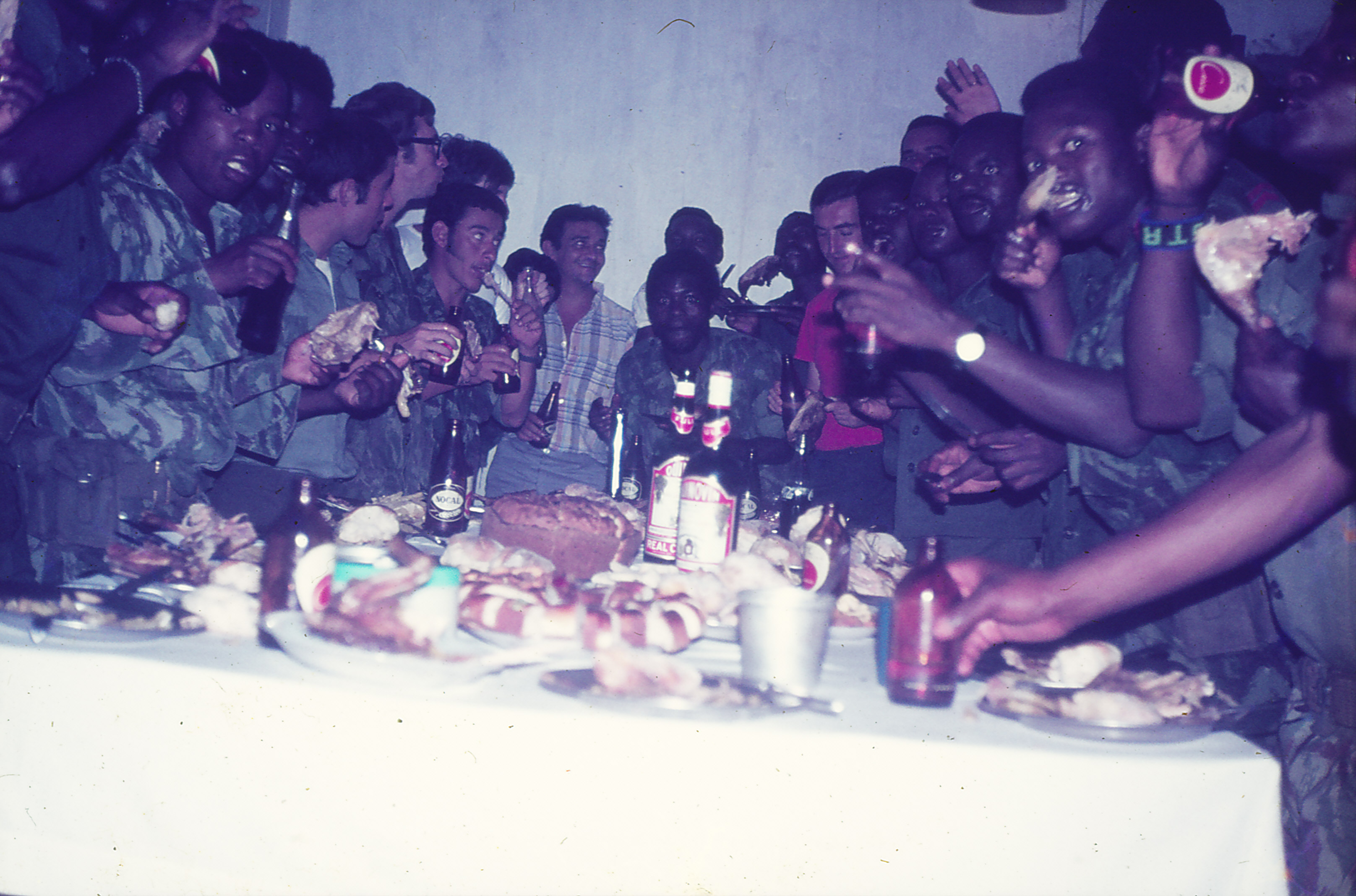
"Xmas at Dima outpost
Not long after, we heard the sound of helicopters probably looking for us, but they were too far south from where we were. Later on we found out that the pilot of the search helicopter instead of looking for us decided to do a bit of hunting. He preferred to "search" in the savannas south and around the Kirongosi lagoon than go north into the Tossi area. During a refuelling stop in Mavinga one of our soldiers spotted a dead leopard inside of the helicopter covered with a canvas.
We made sure we expressed our appreciation to the pilot in future encounters. The rest of my combat group started arriving on foot in Mavinga the day before and raised the alarm. One of the groups sent to look for us found us close to the Kirongosi lagoon that afternoon and radio back the good news.
Soon after they spotted us, the batalion Commander arrived in on a helicopter. After dropping him the helicopter took off and started circling the area. The commander was furious with us and with the pingalin (Swagger Stick) hitting his boots he made us well aware of that. We had dishonoured the Portuguese Army, he said. According to him we, the Portuguese Army, never lost a battle in that war and worse of all we never ran away from the enemy.
He commanded me to go back, flatten and scorch the land and everything else on our way to clear our reputation (?). I asked him to look at my men and tell me if that was the sight of a group that would flatten and scorch anything. When the rest of my group overheard the conversation they started getting a little too agitated for the comfort of the Colonel and he immediately reversed the orders and called the helicopter to pick him up.
Later on Sergeant Pina, after recovering from his burning desire for drowning, adopted a jiboia (boa constrictor) as a pet and gave it the name of the Colonel in recognition of the "love" we all had for him. We returned to Mavinga that night and we all suffered severe cases of dysentery from the yummy water we had previously drank. However the worse came later in the form of criticism - more like abuse - from our superiors and other army groups. We lost a battle against what everyone believed to be a small group of turras (terrorists).
The next day, during the de-briefing I stood in front of my men to be told that we could not resist the attack because we did not have sufficient fire power. When I reminded them that I raised this very point before we left but no one listened, they told me that I was the commander and I should have forced them to do so. They made me feel and rightly so, responsible for the death of my friend Kassanga.
In a meeting loaded with emotions, as you can well imagine, I realised what I had done. In front of my combat group I decided that from that day on I would command the way I felt right and I would have no mercy for the ones that tried to disobey me. That lesson cleared for ever in my mind any doubts about my position when I am confronted with situations that require hard decisions.
Our report of the events was almost laughed at and to prove the point the batalion organised an operation with troops from Portugal (our company, the 305 Special Hunters were all Angolan troops) to the Tossi and paid dearly for the disdain they treated our information. Seven dead was the result of the operation. Only then the batalion command started thinking that maybe there was some truth about what we were saying.
Then they sent the 25th Company of Commandos to clear the area. My old school friend Gavaia (2015 note: Gavaia passed away sometime ago in Portugal. RIP) was a lieutenant in this company and he again dismissed my words of caution when we discussed the details of the operation. He arrogantly reminded me that they were Commandos: A Sorte Protege Os Audazes (Luck protects the audacious) was their motto. The 25th operated from Mavinga in a Commando fashion: full of helicopters and fancy footwork. Result: three dead and one commando lost his marbles, when Kuenhe tried to catch him alive, and end up in the psychiatric hospital. No kidding ...! It was a shame that so many lives were lost to prove that we were telling the truth and Kuangungo Kuenhe was a force to be reckon with.
For more than a year we faced Kuenhe with an inferior force. The most one regular company could muster was 60 men and Kuenhe had over 120. For a while the roles reversed and we were the mouse in the cat and mouse game. Our next trips to the Tossi were hit and run type operations. Slowly our persistency started paying out and Kuenhe started loosing numbers. He himself was hit in a foot in one of the clashes and went back to Zambia to recover.
Towards the mid of 1973 the west wing of the MPLA headed by Chipenda (an old football friend of my father) revolted against the Central Bureau of the Party and that, compounded by the failure of their strategy, resulted in the military defeat of the MPLA forces in the Cuando Cubango. Kuenhe returned to the Tossi to gather the remaining of his forces but was killed during a Pirataria Aérea (aerial piracy) as we called our attacks backed by helicopter gunships.
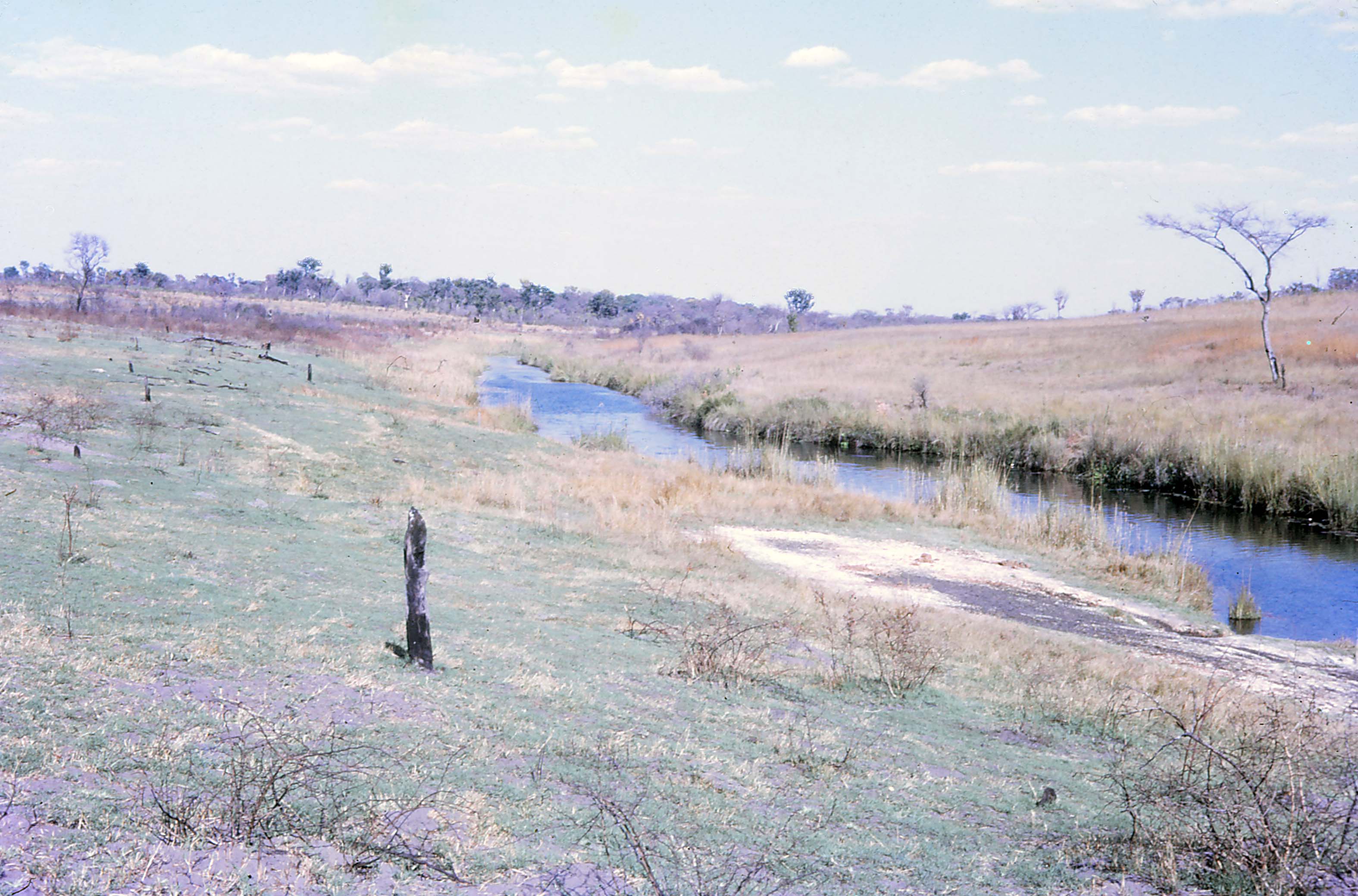
Luengue river south of Mavinga
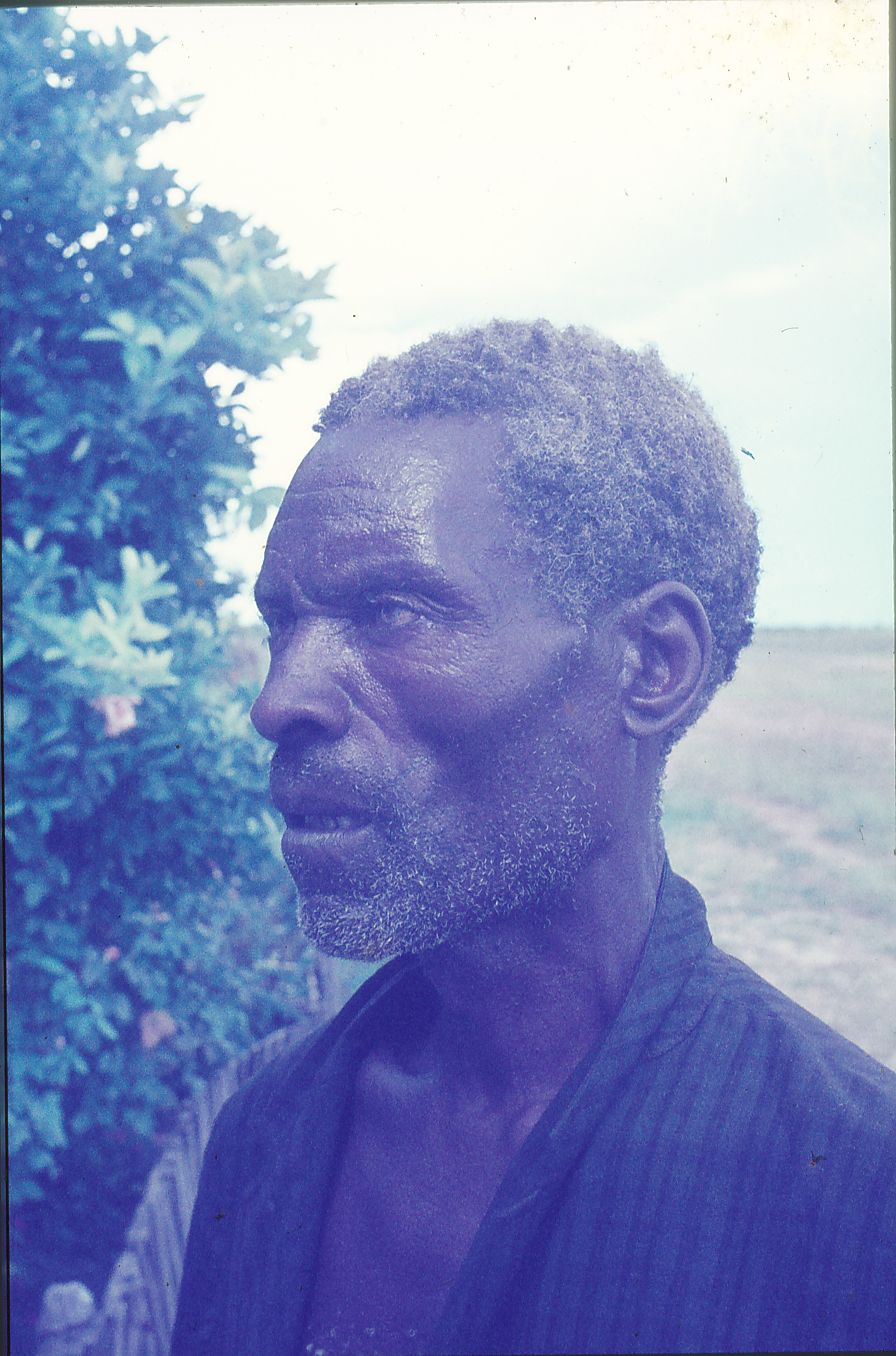
Kassanga's father moments after we got the confirmation of his son's death
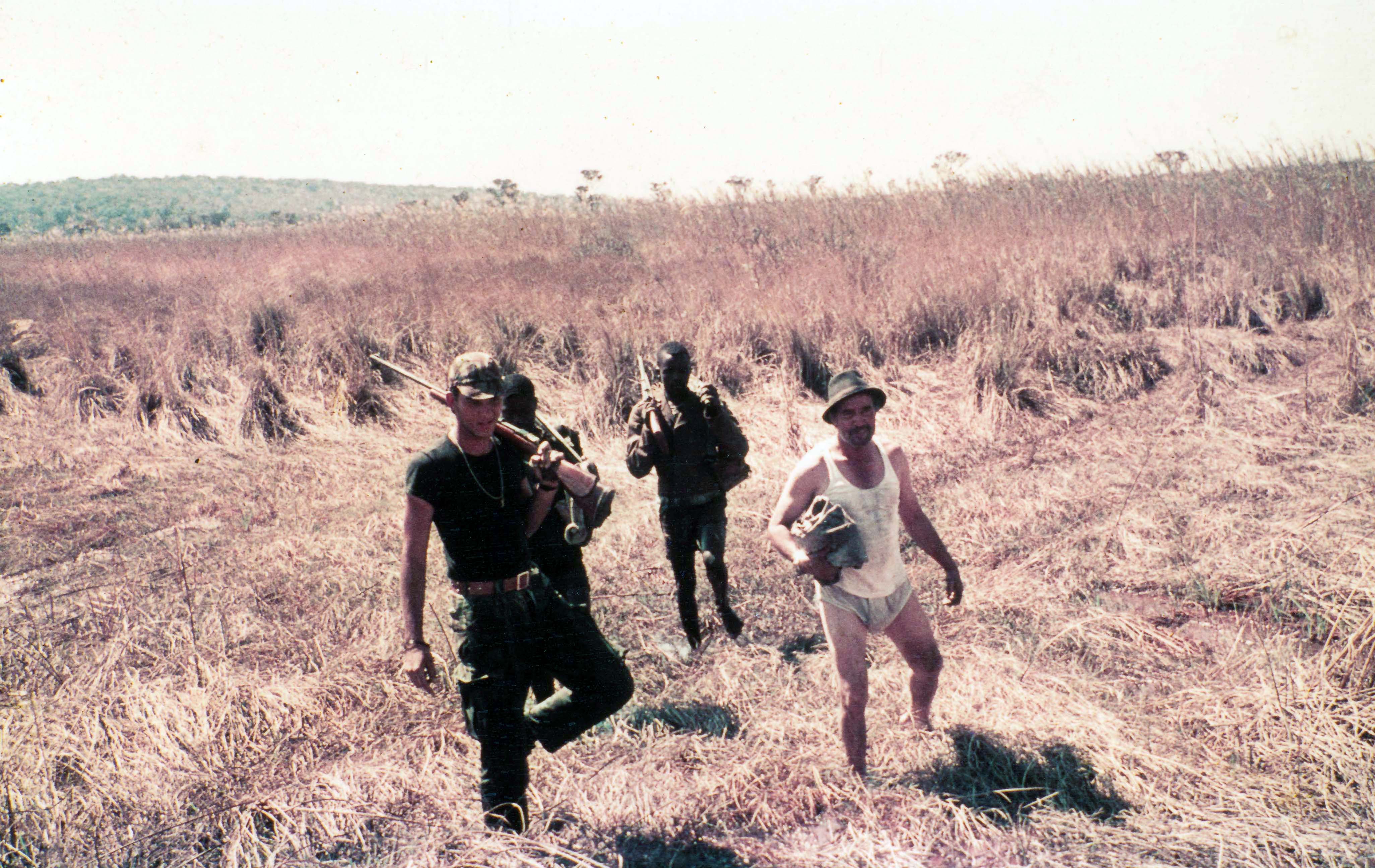
Crossing the river Utembo on foot.
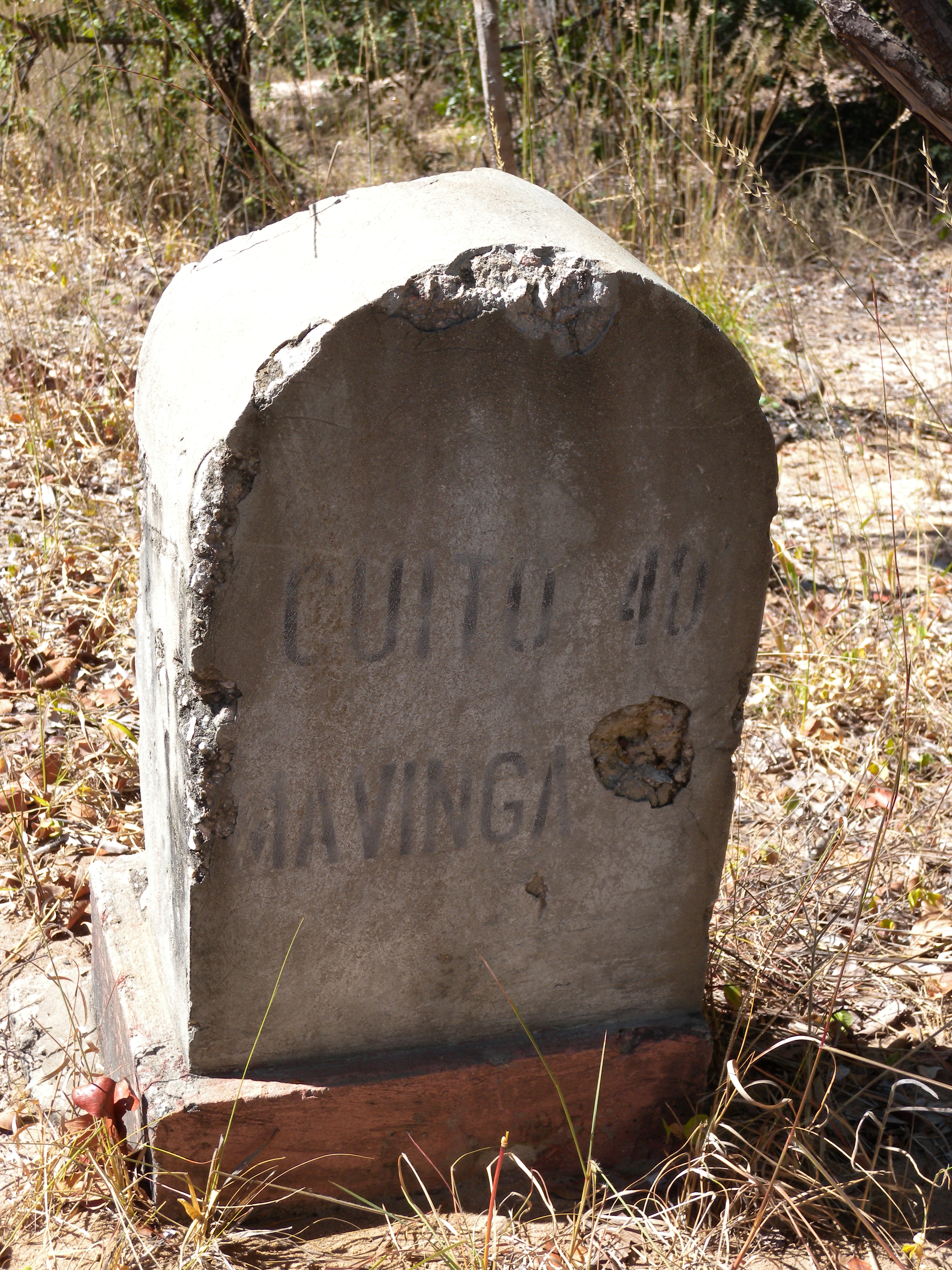
A road mark